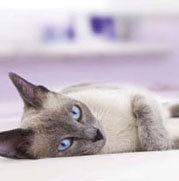Find out everything you need to know about neutering your…
Read more
Selkirk Rex cats’ loving, lively personalities make them a great family pet
A Selkirk Rex cat is a rare cat with a distinctive curly coat, curly whiskers, and an affectionate personality.
They love to be close and can be perfectly content curling up in your lap. Selkirk Rex cats are mostly low maintenance, with a playful and laid-back temperament. They’re an ideal addition to a busy family with children, depending on the individual cat, and they make loving companions.
Vital Stats
| Size: | Medium to large |
|---|---|
| Coat: | Can be both short-haired and long-haired |
| Life span: | 11-14 years |
| Personality: | Friendly, gentle, affectionate and energetic |
large Coat short/
long Life span 11-14years

Selkirk Rex Personality & Temperament
The Selkirk Rex cat’s personality is a lovely blend between playful and gentle.

Food & Diet
As with all cats, Selkirk Rex cats are obligate carnivores, so they need a meat-based diet to keep them healthy.

Selkirk Rex Grooming & Coat Care
A Selkirk Rex cat’s relaxed attitude and social nature means that looking after their coat is easy.

Selkirk Rex Training & Behaviour
Selkirk Rex cats are intelligent when they set their mind to something, but their relaxed personality means they need some extra encouragement when it comes to training.

common illnesses in a Selkirk Rex
Common Selkirk Rex Health Conditions
As a cat owner you will want what’s best for your pet’s health so they can live a long, happy life. Like all breeds, Selkirk Rexs are prone to certain health conditions. To help you be more aware and prepared for these potential ailments if they should arise, we have put together information on the health issues that we see the most in Selkirk Rexs.
Common Selkirk Rex Health Conditions
Mouth and gum disease +
Like most breeds, Selkirk Rex may suffer from gum and dental disease during their lifetime. Gum disease occurs when some (or all) of a tooth’s deep supporting structures become inflamed. This begins when food, bacteria and minerals accumulate along the gum line, leading to the build-up of a brown scale known as tartar. When this undermines the gum the condition is called gingivitis. Eventually, small spaces can form between the gums and the teeth creating pockets of space for bacteria to grow, resulting in what is known as periodontal disease. The bacteria from infected gums can spread around the body and damage the liver and kidneys. This condition can be prevented with basic routine care such as feeding cats dry food and brushing their teeth, helping them to lead a normal, pain-free life.
Eye conditions +
Like all cats, the Selkirk Rex can suffer from eye problems such as conjunctivitis (inflammation of the insides of a cat’s eyelids); glaucoma (caused by increased pressure inside the eyeball); cataracts (opacity of the lens); entropion (inward rolling of the eyelids); or retinal problems. This breed is particularly prone to an excessive amount of discharge from the eye as a result of its twisted and partially blocked tear ducts. Treatment of each eye condition depends on the type and severity of the problem, although many are treated using eyedrops.
Heart disease +
Heart disease in cats refers to when the heart’s structures aren’t working as they should be. There are two categories of heart disease: congenital (meaning the cat is born with it) and acquired (meaning the disease develops later in life). Congenital heart diseases include defects in the wall of the heart, abnormal valves and blood vessels. Selkirk Rex are prone to a disease called hypertrophic cardiomyopathy, which can lead to heart failure. Whilst this condition is not curable, it can be treated with lifelong medication.
Pancreatitis +
Pancreatitis is an inflammation of the pancreas. It can come on suddenly or grumble under the surface over a longer period of time (chronic). The chronic form is more common in cats. Pancreatitis can be caused by trauma, parasites, infection, or drug reactions, although often no identifiable cause is detected. Treatment is usually required over two time frames: the acute phase involves intravenous fluids and careful monitoring of a cat’s blood parameters; in the longer-term, dietary management is required to ensure that a cat can continue to live normally.
Gastrointestinal tract disorders +
The Selkirk Rex, like all cats, can suffer from problems affecting the gastrointestinal (GI) tract. The GI tract is a long, winding tube that starts at the mouth and ends at the anus, with various twists and turns along the way. Conditions such as gastroenteritis caused by infections (like feline enteritis), poisoning or an obstruction within the bowel (due to the cat eating string for example) commonly cause vomiting and/or diarrhoea. Treatment depends on the exact cause, but prompt intervention usually results in a full recovery.

What to know before you buy or rehome an Selkirk Rex cat
They’re a low-maintenance breed but keep these tips mind so your Selkirk Rex cat stays happy and healthy.
Selkirk Rex insurance considerations
Selkirk Rexs sometimes suffer with certain health conditions and may require treatment. Petplan cat insurance offers peace of mind that they will always be protected.
Get a Selkirk Rex quote















